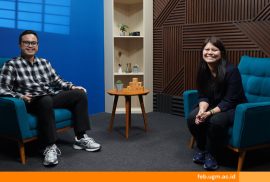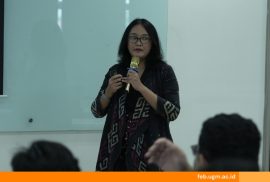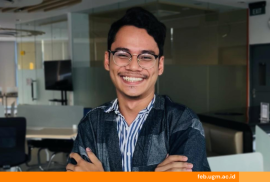World Class Professor (WCP) 2020 was held for the second time (10/23/2020), which in the second seminar took the theme “Innovating Accounting Education”. Given the condition of the Covid-19 Pandemic, the seminar was held online through the Zoom Webinar Platform. In this seminar there are two sessions that will each discuss the topic of accounting education in an international perspective and an Indonesian perspective.
The speakers for the international perspective session were Prof. Keryn Chalmers as President of IAAER and Dean of the Swinburne School of Business at Swinburne University of Technology, Prof. Jacqueline Birt as President of AFAANZ, and Dr. Janine Muir as a Lecturer in Accounting at Swinburne University of Technology. The speakers for the Indonesian perspective session was Dr. Syaiful Ali, Lecturer at the Department of Accounting, Faculty of Economics and Business UGM, Isnaeni Achdiat as Managing Partner, Indonesia Market, EY Consulting, and also Singgih Wijayana, Ph.D., Chair of Undergraduate Program of Accounting FEB UGM, and Member of the Financial Accounting Standards Board of the Institute of Accountants Indonesian (DSAK IAI)
The first session was the presentation of topics from an international perspective by Prof. Jacqueline Birt, which will discuss the topics regarding Information and Communication Technology in Accounting Education. The discussion was hosted by Prof. Keryn Chalmers who led the discussion and presentation on this international perspective.
Jacquiline said that as educators, we must ensure that our students are what is needed in the real professional world.
“As educational accountants, we want our students to understand how to make or provide information for internal users and external decision-makers,” she explained.
According to him, that is why the current role of accounting has an impact on technology which is now also changing in the business world. Jacqueline said that accounting students in the current era not only need accounting skills, but they also need digital technology skills. He explained that accounting students should have two skills related to digital technology.
“Big Data and Data Analytics, the student must know how the complexity of Big Data is, what mechanisms and tools to analyze Big Data, as well as Data Analytics that helps us to increase efficiency and manage risk better. These two things are very important for students to understand in the current era,” she said.
In addition, he also highlighted that students need to develop communication skills and behavioral skills. According to him, this is what can lead to professional skepticism for prospective accountants.
“We cannot depend on all decisions on data, because data has certain limitations. Therefore we need to understand what the data means. This is the importance of professional skepticism being developed for our students,” explained Jacqueline.
The second speakers from an international perspective are Dr. Janine Muir, who explained the material and shared experiences about Online Delivery in Accounting Education. Janine gave an example of online delivery that she applied during lectures. According to him, lectures should not only provide reading content for students but also how they can feel they are included in the ongoing learning.
Because the essence of online teaching, according to him, needs to ensure student involvement. It’s important to think about student engagement in terms of the two dimensions of building engagement and building connections.
“We need to encourage student involvement by using their microphones and videos. They may be uncomfortable at first, and our job as educators is to make them comfortable, that’s part of accounting education to help students overcome obstacles they might have,” Janine said.
The next session is the presentation of topics from the Indonesian perspective by Isnaeni Achdiat who will discuss the topic of Education in a Disruptive Era. The discussion was hosted by Singgih Wijayana, Ph.D., who led discussions and questions and answers regarding the Indonesian perspective. Isnaeni said that the Indonesian Education Curriculum must be connected to the practices or needs of the Industrial World.
According to him, from the point of view of the world of practice, there have been many drastic shifts and raise many questions whether accounting graduates are still relevant in the technological era.
“Governments, large organizations, large companies have implemented a lot of Big Data Analytics, this is something that must be learned so that we are not disrupted, that we remain relevant. Students must learn and understand what technology is,” said Isnaeni.
Isnaeni said that in the current technology era, there are new resources that can be optimized.
“In the current era, data is a new resource, there are organizations that don’t have a lot of physical assets, they don’t have a factory, they just have minimal tangible assets, but they are very profitable,” he explained.
“Today’s wealth can arise from sophisticated algorithms, plus data, the ability to analyze, and combine it with extra data, be it semi-structured, unstructured, which makes us have wealth of data,” he added.
Related to accounting education, he revealed that the transformation of accounting education needs to be directed at how technology education can be absorbed by all accountants without exception.
“Not only programs, the accounting education curriculum must learn programming, at least there must be because we can carry out logic programs, but programming is also currently mandatory in all study programs, including accounting”, he explained.
The idea for accounting education, what we can do is to enrich the accounting curriculum, include programming courses, we also have to add cross-faculty credit, a collaboration between teachers and practitioners. The curriculum should also focus on digital business and soft skill development. To support this, Isnaeni said that the accounting education curriculum must be changed dynamically, and include digital material in the learning.
The next session was the presentation of material by Dr. Syaiful Ali, who discusses innovation in Accounting Education. Syaiful said that in the Covid-19 era, there was double disruption because Covid-19 changed business processes. He gave an example of the many cashless transactions.
In addition, according to him, Covid-19 also created an economic recession which had an impact on efficiency, so this was what made existing jobs a big question mark. Therefore, Syaiful said that the current workforce is expected to be able to adapt, reskilling the ability to do work. For example, from initially teaching offline, educators must also be able to teach online.
“According to The Future Jobs Report 2020, in 2025, 85 million jobs will be displaced, there will be many changes, there will be a lot of human interaction with machines, and algorithms,” he explained, citing data from the World Economic Forum.
“Maybe accountants will not disappear, but accountants’ jobs will change, that’s how accounting education can improve accounting skills in the context of information technology,” he said.
In the context of Big Data, the most important thing is defining and finding the right problem, and soft skills, namely critical thinking, are needed at the beginning to trigger the next steps, determine data availability and the process of the data, “he explained.
He conveyed data that in the context of implementation in ASEAN, the application of Big Data in the industry was only around 13%.
“Actually, we are not really left behind, we can catch up in this context, because in the field it is very much needed”, he concluded.
Reportage: Sony Budiarso/Kirana Lalita Pristy
Video: https://youtu.be/BUj98goq7yU




